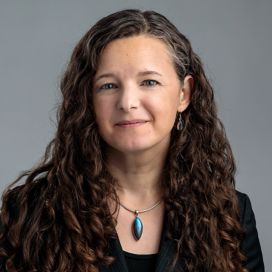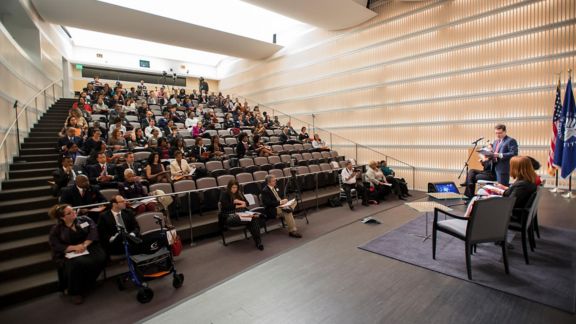Medicare Current Beneficiary Survey (MCBS)

Problem
Medicare’s administrative records don’t give the full picture of its services.
More than 58 million people—one in six Americans—receive health insurance through Medicare. As the payer, Medicare records each visit to a doctor, clinic, or hospital. What’s lacking, though, is how individual patients experience Medicare. For example, how much do they have to pay out-of-pocket for supplemental insurance, co-pays, and services that Medicare doesn’t cover? What treatments might they skip because they’re too expensive or inaccessible? How satisfied are they with the care they receive? The Centers for Medicare & Medicaid Services (CMS) contracted with NORC at the University of Chicago to find answers to these and other questions.
Solution
NORC conducts the Medicare Current Beneficiary Survey, a constantly evolving source of data on the Medicare program.
A leading source of information on Medicare and its impact on beneficiaries, the Medicare Current Beneficiary Survey (MCBS) collects comprehensive data on beneficiaries’ health insurance coverage, health care utilization and costs, access to care, and satisfaction with care, as well as special interest topics such as drug coverage, knowledge about the Medicare program, and housing characteristics.
The MCBS is a continuous, multi-purpose longitudinal survey representing the population of Medicare beneficiaries aged 65 and over and beneficiaries aged below 65 with certain disabling conditions, residing in the United States. It is sponsored by the Office of Enterprise Data and Analytics (OEDA) of the Centers for Medicare & Medicaid Services (CMS). The MCBS has been continuously conducted since 1991, completing more than 1.2 million interviews since its inception. NORC conducts the full range of MCBS survey activities including sampling, data collection, data processing, editing, imputation, and delivery of files to CMS for final processing and dissemination.
To maximize the quality and utility of its data, the MCBS features:
- Linked self-report and administrative claims data: The MCBS collects information directly from beneficiaries and then links their responses to administrative claims.
- Complete source of payment information: The MCBS collects survey-reported data on all sources of payment for health care costs, including those not covered by Medicare.
- Rotating panel design: The MCBS features a rotating panel that is representative of the population of all Medicare beneficiaries for the survey year. Each panel is interviewed up to three times a year over a four-year period, enabling longitudinal analysis.
- Inclusion of beneficiaries living in a facility: The MCBS follows beneficiaries into and out of long-term care facilities to maintain a comprehensive profile of their health care.
- Oversampling: Hispanic beneficiaries, beneficiaries with disabilities (aged below 65), and beneficiaries aged 85 and over are oversampled to ensure sufficient sample for analysis.
- Medicare Advantage (MA) beneficiary data: The MCBS collects comprehensive health care and cost and use data for MA beneficiaries, allowing researchers to analyze data in the absence of MA administrative claims.
Result
MCBS findings have altered Medicare’s coverage plans and continue to inform program and policy advancements.
Data from the MCBS inform policy and program advancements in Medicare, including creating new benefits such as Medicare’s Part D prescription drug benefit. They also inform highly visible publications, including those from the Congressional Budget Office, the Medicare Payment Advisory Commission, the Federal Interagency Forum on Aging Related Statistics, and the Centers for Medicare & Medicaid Services Office of the Actuary, and those published in such peer-reviewed journals as the American Journal of Managed Care, Health Affairs, Health Economics, Health Services Research, Journal of General Internal Medicine, and the New England Journal of Medicine.
MCBS data are available to users via three annual Limited Data Sets (LDS) – the Survey File - Early Release, the Survey File, and the Cost Supplement File. The Survey File contains information on beneficiaries’ demographics, health insurance coverage, self-reported health status and conditions, access to care, and satisfaction with care, among many other topics. The Survey File - Early Release contains a subset of key topics from the Survey File that are released earlier to improve the timeliness of MCBS data. The Cost Supplement File contains survey-reported data, linked with administrative data, on beneficiaries’ health care utilization, expenditures, and sources of payment, including out-of-pocket costs and payments. The Cost Supplement File can be linked to the Survey File to conduct health care cost and utilization analyses.
In recent years, CMS and NORC have made several improvements to increase the accessibility and utility of the MCBS. These improvements include releasing two annual microdata Public Use Files (PUFs) for the Survey File and Cost Supplement File, the new Survey File - Early Release, and an integrated suite of public resources. NORC supports CMS in releasing annual MCBS Data Year Release Notes that accompany the LDS releases, the year-agnostic MCBS Data User’s Guide and MCBS Methodology Report, annual documentation to accompany the microdata PUF releases, a Glossary, a Chartbook, an annotated Bibliography, tutorials for new and advanced data users, and annual Variable Crosswalks. MCBS infographics, data highlights, and PUF and Early PUF table packages are also available on a wide variety of topics, such as financial well-being, preventive care, and beneficiary characteristics by metropolitan residence status.
NORC also has supported CMS in conducting rapid response surveys on different topics for MCBS beneficiaries. In response to the COVID-19 pandemic, the MCBS COVID-19 Summer 2020, Fall 2020, and Winter 2021 Community Supplements collected vital information on how the pandemic impacted the Medicare population, including preventive behaviors, forgone care, sources of COVID-19 information, and COVID-19 vaccination. In addition, data on beneficiaries living in facilities were collected through the MCBS COVID-19 Fall 2020 and Winter 2021 Facility Supplements. In 2022, NORC administered the Organization for Economic Cooperation and Development Patient-Reported Indicator Surveys (OECD-PaRIS) supplemental survey to MCBS participants to collect data that could be compared internationally with other OECD countries. The PaRIS survey helps close critical policy gaps by focusing on:
- How patients experience health care
- How patients assess the results of their care
The PaRIS survey also collects vital information about primary health care by asking about topics such as the respondent’s health, health behaviors, physical functioning, psychological well-being, quality of life, patient activation and confidence in managing their health care, access to health care, and experiences with health care and health providers.

Are you a respondent?
Questions about the survey? Experiencing technical difficulties? Contact us:
Learn More About the Study
Related Tags
Project Leads
-
Kari Carris
Vice PresidentProject Director -
Michelle Strollo
Senior Vice PresidentSenior Staff -
Cynthia Howes
Vice PresidentSenior Staff -
Whitney Murphy
Principal StatisticianTask Lead -
Nicholas Davis
Principal StatisticianTask Lead -
Andrea Mayfield
Senior Research DirectorTask Lead -
Jennifer Vanicek
Principal Research DirectorTask Lead -
Carrie Goetsch
Senior Data ScientistTask Lead -
Elise Comperchio
Senior Research ScientistTask Lead -
Becky Reimer
Principal Data ScientistTask Lead
















